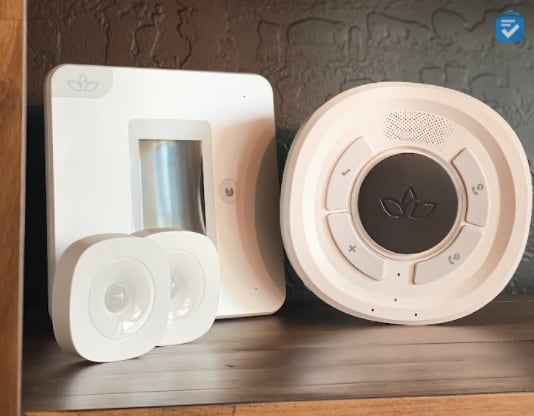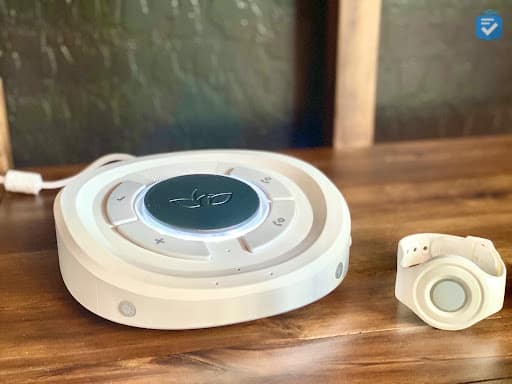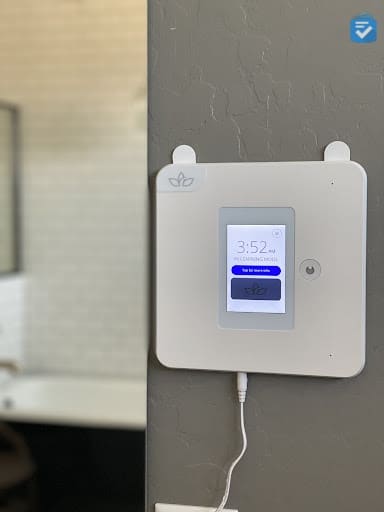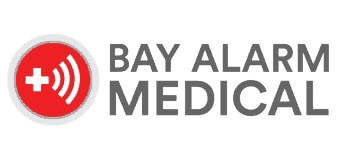
Aloe Care Health Medical Alert Review

Our Favorite Medical Alert Systems
We picked out a few more recommendations worth considering:
Aloe Care Health by the Numbers
| Time Spent Testing | 168 Hours |
|---|---|
| Starting Price | $24.99 per month |
| Contract Minimum | 1 Month |
| Average Response Time | 19 Seconds |
| Customer Service Response Time | 8 Seconds |
Aloe Care Health keeps users safe with 24/7 professional monitoring, wearable emergency buttons, and a family app that allows caretakers to keep track of their loved ones. Their devices even have temperature sensors, fall detection, motion detectors, and voice commands, giving them a modern twist on a tried-and-true formula.
But how well does Aloe Care Health’s system stack up to similar devices? More importantly, how well can it protect you or your loved ones?
Pro Tip: Are you new to the world of medical alert systems? Take a look at my guide to medical alert devices to learn about this lifesaving technology.
Aloe Care Health Pros and Cons
Here are my main takeaways from using the Aloe Care Health medical alert system.
Aloe Care Health Pros
- Voice commands: Among Aloe Care Health’s many innovative features — motion and air-quality sensors, for example — is the ability to make calls using only your voice. If you don’t have your emergency button on hand, this feature could be a lifesaver.
- Caregiver features: It’s now standard for medical alert systems to include a caregiver app or dashboard. Aloe Care Health’s app, however, goes several steps further. When logged in to the app, you can track a loved one’s mobility, keep tabs on calls, and be contacted for check-ins.
- Check-in system: Rather than contacting the emergency response center by default, Aloe Care Health’s systems give you the option to contact either your primary caregiver or all your caregivers for a check-in. This is a great way to avoid emergency calls and to keep nearby loved ones in the loop on non-emergency situations.
- 30-day trials: After purchasing any Aloe Care Health system, you’ll have a 30-day window to return the devices and cancel your service for a full refund.
- Affordable mobile alert: At $24.99 per month, Aloe Care Health’s Mobile Companion is one of the most affordable medical alerts with GPS.
Aloe Care Health Cons
- No warranty: Unlike other manufacturers that provide warranties on their purchased equipment, Aloe Care Health does not currently offer a warranty — paid or otherwise.
- Hardware costs: Aloe Care Health requires you to buy its equipment outright rather than renting it. Its subscription costs are about average for the industry, but the startup costs will be a bit higher than those of other manufacturers.
- No wearable fall detection: Aloe Care’s fall detection works on a wall-mounted unit, meaning it will only work in one room. For a system with built-in fall detection, check out our Active Guardian review.
- WiFi required on some systems: Devices such as motion sensors and the fall sensor require WiFi to operate.
Fun Fact: Did you know that Aloe Care Health has partnered with CVS to create the CVS Symphony medical alert system? To learn more, read our CVS symphony review.
Aloe Care Health Systems Overview
All of Aloe Care Health’s systems operate in generally the same way. Each includes a hub, a care button, and both lanyard and wristband attachments for the care button. There are some key differences among the systems, however, that will determine which one best suits you.

- Aloe Care Health Essentials: This package features a smart hub and a care button that is worn either as a wristband or a lanyard. The system is simple and requires few devices, but it still offers everything you need to stay connected to Aloe Care Health’s professional monitoring center. The Essentials system operates on a 4G wireless connection, which means you don’t need Wi-Fi in your home to use its features.
- Aloe Care Health Essentials Plus: The Aloe Care Health Essentials Plus system includes everything in the Essentials package, along with a mobile companion. This handy device functions as an on-the-go medical alert system that can protect you both in and outside your home. Using GPS technology and two-way talk, the device can be used to contact emergency responders. It also features fall detection, which will automatically alert responders if you fall.
- Aloe Care Health Total Care: Aloe Care Health’s other option is the Total Care system, which includes a smart hub, care button, smart fall sensor, mobile companion, and two motion sensors. This system generally works like the Essentials Plus system. In an emergency, you can press your care button (or one of the buttons on the smart hub) to be connected with either the Aloe Care Health monitoring center or one of your preselected caregivers. The mobile unit can automatically do so.
- Aloe Care Health Mobile Companion: This portable cellular device can be purchased as a stand-alone medical alert system. It won’t give you the detailed activity tracking of the in-home systems, but it offers two-way talk, GPS tracking, and built-in fall detection.

Other medical alert companies offer tiers of monitoring — the higher-priced tiers usually offer features such as fall detection — but Aloe Care Health offers only one monitoring plan for each system, so the system you choose will dictate the type of monitoring you receive.
FYI: Aloe Care Health’s systems each include built-in backup batteries to ensure your system can continue functioning normally in the event of a power outage.
Using My Aloe Care System
Once my Essentials system arrived, I was excited to begin the setup process. Inside the box, I found:
- 1 Aloe Care smart hub
- 1 power cord
- 1 care button
- 1 wristband attachment
- 1 lanyard attachment
- 1 set of instruction manuals
Installation
The first step was to place my smart hub in the room where I spend the majority of my time. I chose an end table in my living room, directly beside a wall outlet. Once I plugged in the smart hub, it chimed and began pulsing with a blue light. Since the unit operates entirely on a 4G cellular connection, I didn’t even have to connect it to my in-home Wi-Fi network. I simply pressed the black button in the center of the smart hub to confirm my connection.
Once I established that my device was connected, all I had to do was remove the wrapping from my care button and decide whether I wanted to wear it as a lanyard or a wristband. The setup process took less than five minutes — as fast as I’ve seen with any medical alert system.
Testing
When making calls to Aloe Care Health’s monitoring center, I received consistently prompt responses. In less than 20 seconds, my calls were fielded by caring agents who took the time to assess my situation and plan an appropriate response, whether that meant contacting emergency services or someone in my caregiver network. I made distress calls using both the smart hub’s assistance button and my personal help button, as well as voice commands by saying the word “emergency.” Even from a different room, my Aloe Care Health system could pick up my voice and facilitate communication with the monitoring center.
I was also excited to test the non-emergency calling features of the Aloe Care Health system. When I pressed the Primary Caregiver button, it notified my designated primary caregiver on his smartphone. He could even communicate with me directly through my smart hub. The All Caregivers button accomplishes the same function, but it alerts everyone in your caregiver circle. This is a great feature for people with several nearby friends and family members, since it keeps them in the loop on the well-being of their loved one.
The smart hub also features motion sensors. These not only activated my device’s built-in nightlight but also reported activity levels through the Aloe Care Health app. When I went long periods without moving, my caregivers were notified. My smart hub also reported on air quality and temperature, providing both metrics through the app.
Aloe Care Health Video Review
If you want to see the Aloe Care Health system in action, check out my video review below. In it, we take a look at the system’s features and see how they work in practice.
Aloe Care Health Pricing
Compared to other medical alert systems, Aloe Care Health has a pretty straightforward pricing model. Each system comes with an equipment fee and a monthly subscription cost. For example, my Essentials package had a one-time $149.99 charge for the equipment and a monthly fee of $29.99. The most expensive system, Total Care, costs $299.99 up front and $49.99 a month.
Aloe Care Health’s prices fall somewhere in the middle for medical alert systems. The one exception is its Mobile Companion. This all-in-one mobile system with fall detection costs $99.99 up front and $24.99 per month, which is very affordable for a mobile unit.
For more information about Aloe Care Health and its systems and prices, take a look at the Aloe Care Health pricing page.
Final Thoughts on Aloe Care Health
What I appreciate most about Aloe Care Health is how it prioritizes a network of local caregivers. Its response team will come in handy in emergencies, but the core of its medical alert systems is the family created through the Aloe Care Health app.
For those with loved ones nearby, Aloe Care Health is the perfect way to stay in touch and keep track of your well-being. Aging in place isn’t always easy, but a system from Aloe Care Health can make it significantly easier and safer.
All of this makes Aloe Care Health one of my picks for the best medical alert system so far this year.
I’d recommend Aloe Care Health if you want:
- Detailed caregiver tracking: With the Aloe Care Health app, caregivers can make direct calls to their loved one’s system and receive alerts about activity, location, and home temperature.
- Voice commands: For those who don’t like wearing a help button, an Aloe Care Health system can make calls with simply the sound of your voice. To see more systems like this, check out my rundown of the best voice-activated medical alert systems.
- Affordable mobile protection: At only $24.99 per month, Aloe Care Health’s mobile companion is one of the cheapest mobile medical alerts I’ve seen — and it even has built-in fall detection.
- No long-term contracts: Systems like Life Alert cost so much because they require three-year contracts; however, Aloe Care Health allows you to unsubscribe at any time without incurring additional fees making them one of our favorite alternatives to Life Alert.
I wouldn’t recommend Aloe Care Health if you want:
- A landline-based system: Aloe Care Health does not offer a landline option. If you’re looking for one of these durable and affordable systems, check out my rundown of the best in-home medical alert systems.
- No equipment fees: Aloe Care Health charges one-time equipment fees for all its systems. To learn about medical alerts with no initial charge, read my Medical Guardian reviews and Bay Alarm Medical reviews.
- Wearable fall detection: Aloe Care Health uses motion sensors for fall detection. If you want a wearable fall detection unit, then check out my rundown of medical alerts with fall detection.
Aloe Care Health Frequently Asked Questions
-
Can I use an Aloe Care Health system outside my house?
Depending on the size of your house, you may be able to use your system in your garden or on your porch. It depends on how well you can communicate with your base station. Beyond this distance, however, you may want to consider a mobile medical alert system.
-
Does Aloe Care Health have subscription tiers?
Aloe Care Health offers four different medical alert systems: Essentials, Essentials Plus, Mobile Companion, and Total Care. Each system has one subscription service, and there are no premium subscription plans.
-
How many people can I add to my Aloe Care Health caregiver circle?
There is no limit to how many people you may include in your care circle, but there can be only one primary caregiver. This is the account holder, and they have the power to add more contacts to the care circle.
-
What is a check-in call, and how is it different from contacting the monitoring center?
Check-in calls take place with a member of your care circle. If you or your caretaker wish to escalate the call, you can do so by pressing the emergency button, which will loop in a member of the emergency response team. In this three-way call, you will coordinate a response to the situation.
-
Can I add fall detection to my Aloe Care Health Essentials package?
If you want automatic fall detection as part of your Aloe Care Health system, then you’ll need to purchase the Total Care bundle, which includes the smart fall sensor.





